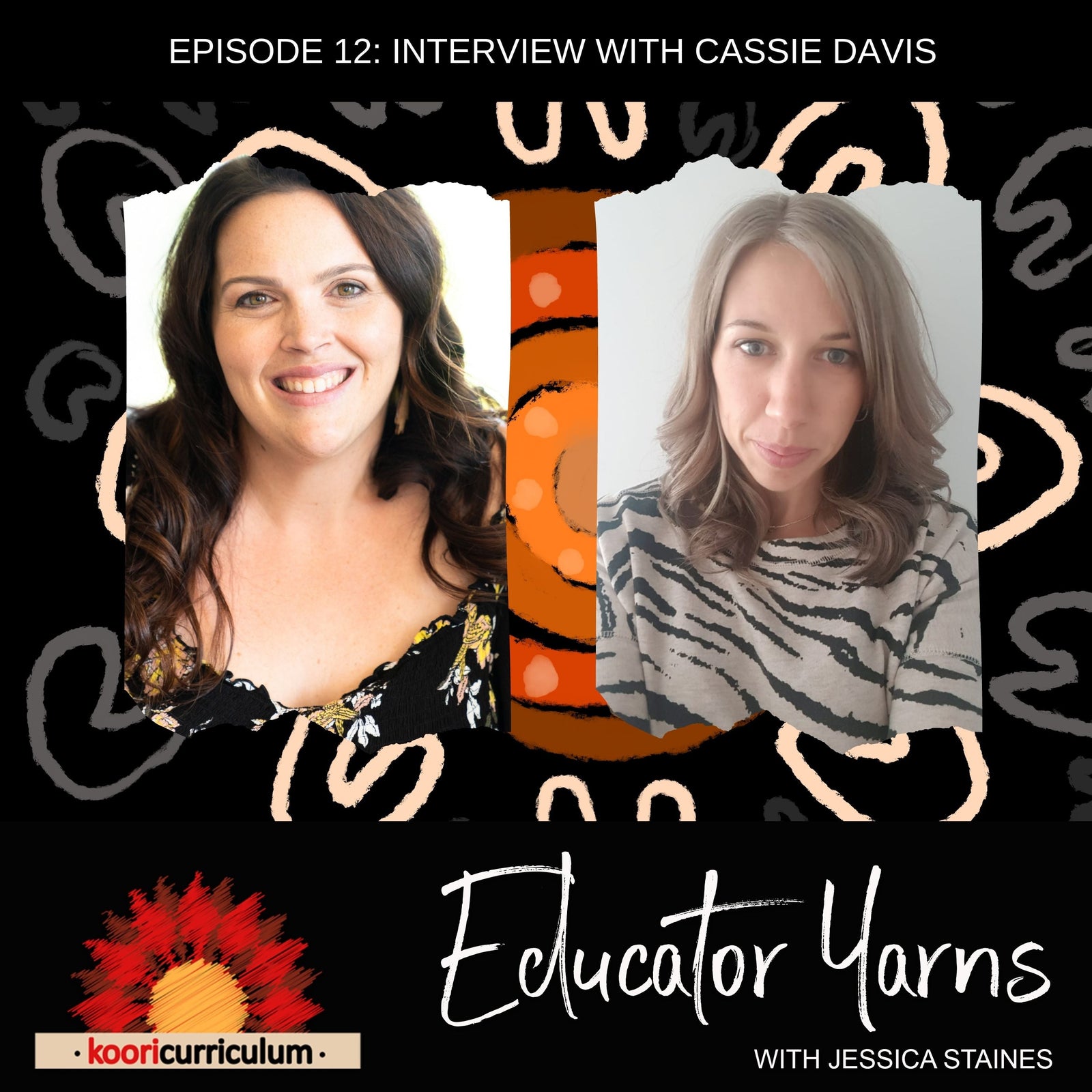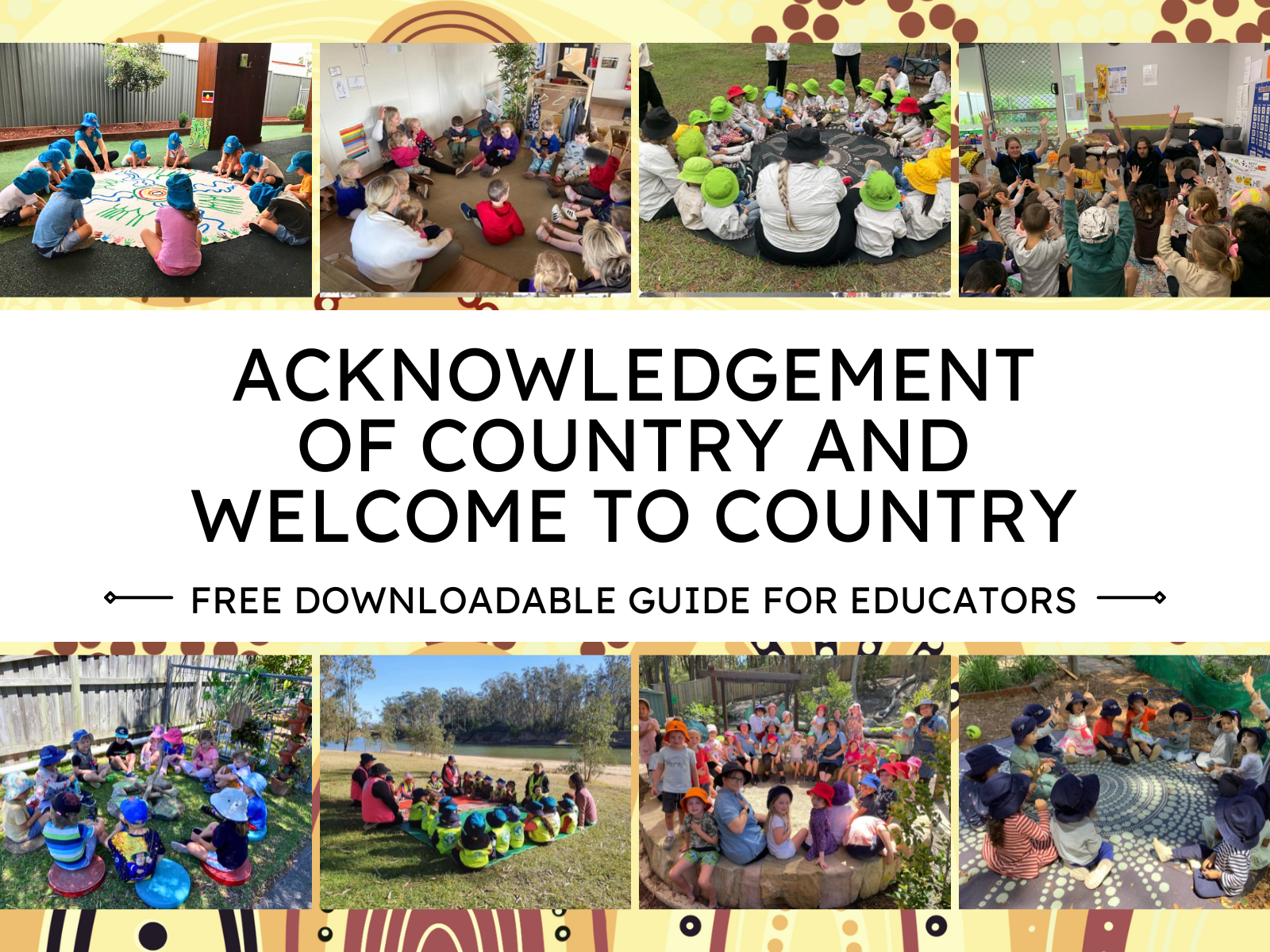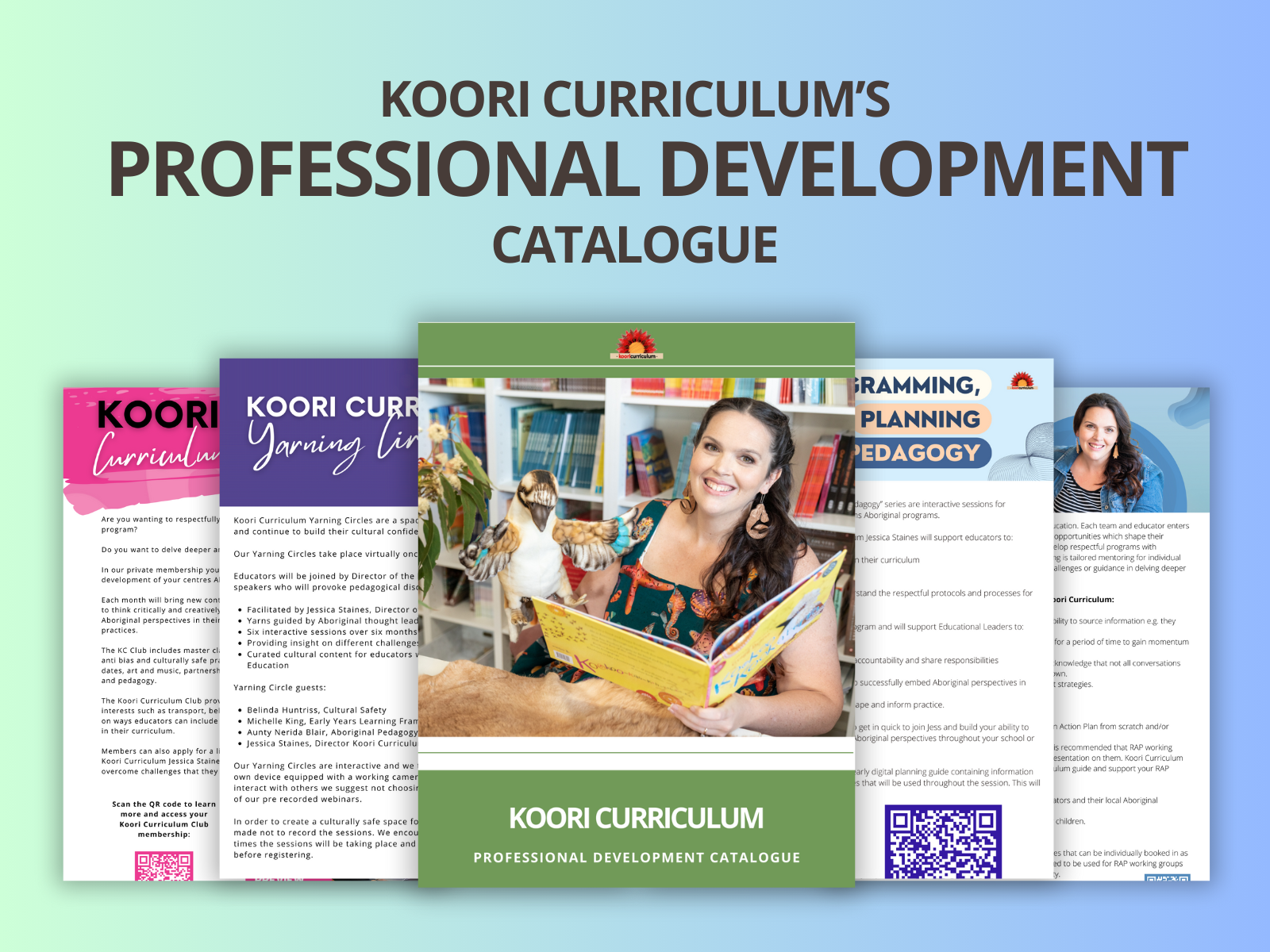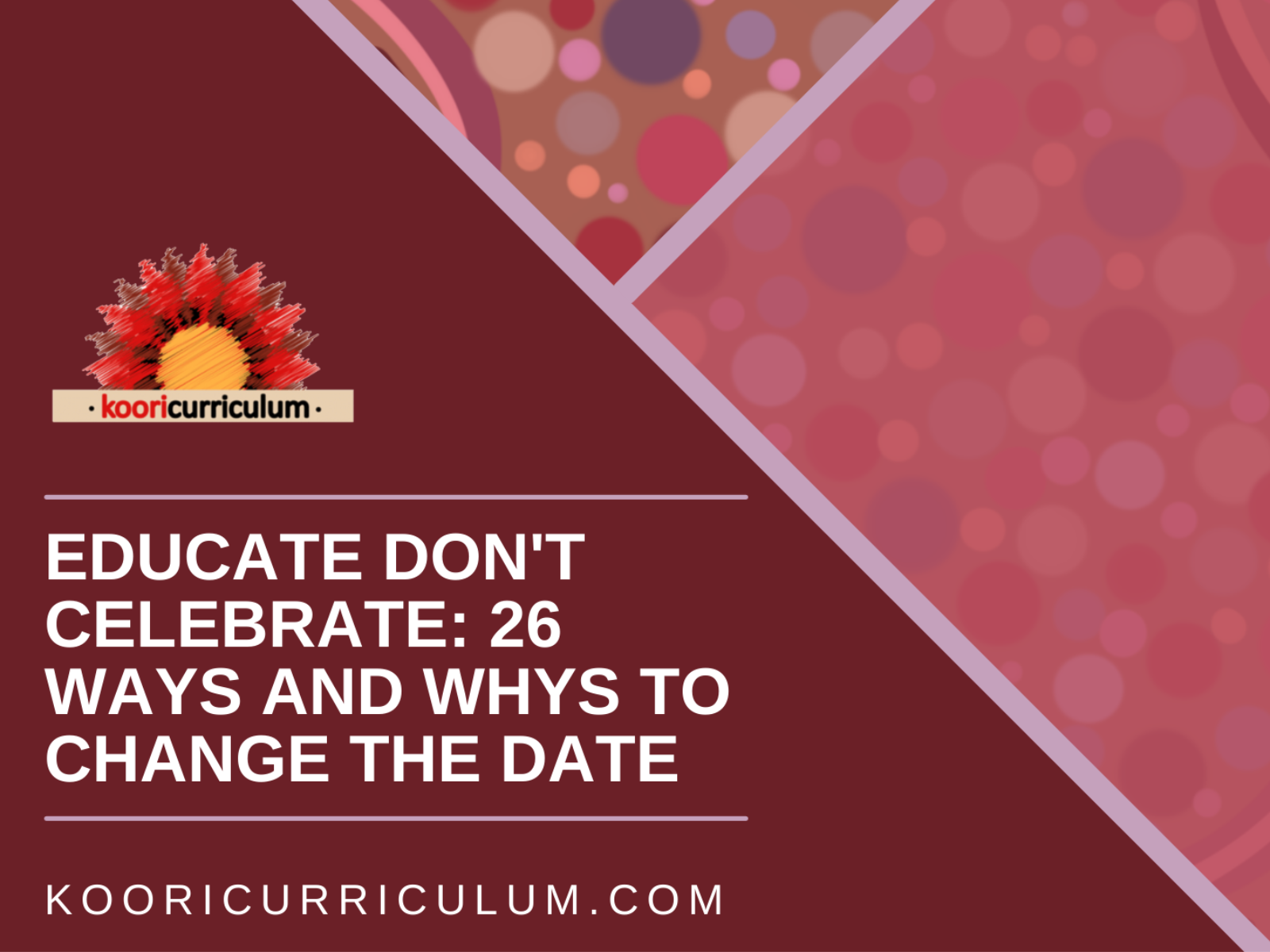
Educator Yarns Season 2 Episode 12: Interview with Cassie Davis
Today on Educator Yarns Jessica speaks with Cassie Davis from Penrose Kindergarten Tarneit, Melbourne. Part of the Wyndham City Council of the Kulin Nations.
Cassie talks about how her trip and time spent within the community of the Torres Strait Islands informed her passion and desire to embed a richer narrative of their culture within her centre and pedagogical practices. This cultural immersion experience sparked a deeper understanding of custodianship and sustainable practices within the service.
Show Notes
Cassie Davis:
And also just navigating the internet as well. So we've come across quite a lot of books that have helped us. And we feel that we may have been able to bring in a Torres Strait Islander perspective there because we usually take the children on a beach walk, exploring the sea, different elements of the sea.
Jessica Staines:
And I think that's it, is that we have to become active researchers as educators.
Speaker 3:
You're listening to the Koori Curriculum Educator Yarns with Jessica Staines.
Jessica Staines:
I'd like to acknowledge the Darkinjung people, the traditional owners of the land on which I am recording this podcast. I pay my respects to their elders both past, present, and emerging, and pay my respects to all Aboriginal and Torres Strait Islander listeners.
Hi, everyone. My name's Jessica Staines, director of the Koori Curriculum. For those of you that aren't familiar with our podcast, season two is all about our new book, Educator Yarns. We're meeting and interviewing with our educator contributors from right around Australia, who will be sharing little snippets of their piece. It'll be a combination of stories about why embedding Aboriginal perspectives is so important, how to connect with local community, how to embed Aboriginal perspectives in our programme, how to work with anti-biassed approaches and so much more. So make sure you listen in and enjoy the episode. Bye for now.
Today's podcast guest is Cassie Davis. Cassie grew up in the Western suburbs of Melbourne, Victoria. And at the age of 16, back in 2003, she began her career in early childhood education. Cassie has always been passionate about educating young children, and after working in long day care for 11 years, she completed her bachelor of early childhood education. Cassie is now a kindergarten teacher at Penrose Kindergarten for Wyndham City and has been teaching there since 2015. Cassie continues to develop her knowledge of Aboriginal and Torres Strait Islander cultures and perspectives, including understanding local views within the Kulin nations of where her kindergarten surface sits. Cassie developed a passion and appreciation for reconciliation and enjoys sharing her insights and learning journey with her husband, Luke, and their son, Eli.
So thanks Cassie for joining me on the Educator Yarns podcast, again this morning. How have you been?
Cassie Davis:
I've been really good, Jess. Thanks for having me.
Jessica Staines:
Oh, the pleasure is mine. So I think last time when we had you on, you were talking a lot in season one about your experience having travelled out to the Torres Strait Islands, and how you brought that back to your early learning service. And I think that was quite unique because I know a lot of educators really struggle with how to embed Torres Strait Islander perspectives in their programmes. So I was super excited that [inaudible] and you have written for the Educator Yarns book to sort of share that dual experience, I guess, from a Torres Strait Islander perspective and from a non-indigenous perspective of how this work can be done in the early years. So I'm really lucky to have both of you. For those listeners that haven't listened to season one, can you just briefly introduce yourself and where you're working, Cassie?
Cassie Davis:
Yeah, sure. My name's Cassie Davis. I'm an early childhood teacher and I have been for about seven years now. I work for Wyndham City council. And I work at a kindergarten called Penrose Kindergarten, which is situated in Tarneit in Melbourne, and we're on the land of the Kulin nations. And we have a two-unit facility and I work in orange group and we have 33 children across two days a week.
Jessica Staines:
So you've been on quite a journey for some time before having travelled out to the Torres Strait Islands looking at ways that you can embed Aboriginal perspectives in your programme. And that's how we sort of met each other. So I came out and did some workshops with your team, and we also did a workshop around the Aboriginal pedagogy and you started to use a little bit of the eight ways of learning. So you've really got this multifaceted approach, but I think what tends to happen more and more so is that that word Aboriginal and Torres Strait Islander, it just rolls off the tongue together. And quite often it sort of sounds like we're one and the same. [inaudible 00:04:39] There is a big difference between Aboriginal and Torres Strait Islander peoples. And whilst educators are sort of taking leaps and bounds and investigating and discovering ways to include Aboriginal perspectives in their programme, I feel that the Torres Strait Islander perspective is really lacking a lot of the time, and people just don't know where to start. And at the Koori Curriculum, we really don't do Torres Strait Islander perspectives training because I don't see it as my place as an Aboriginal woman.
But you've had that firsthand experience, not just having professional development, but you also had a cultural immersion experience where you travelled out to the islands for... Was it 10 days?
Cassie Davis:
Yes, 10 days. Mm-hmm (affirmative).
Jessica Staines:
Yeah. And sort of really were involved with [inaudible 00:05:28] And so you had those first-hand experiences. And then sort of brought that back into your practise in an early learning service. So I was going to ask you, from your perspective, what do you see to be the main differences between Aboriginal and Torres Strait Islander culture and how that unfolds into your programme?
Cassie Davis:
Yeah. So the really big difference that I've come to learn over time now is that Aboriginal culture, as opposed to Torres Strait Islander culture is different in the sense that Aboriginal people, it's more about country, caring for the land, and, of course, sustainable practises. There's lots of protocols, cultural protocols as well that we need to abide by. Whereas the Torres Straits, it's more about, you know, they live within the sea. So learning about those sea practises, a lot to do with weather. But both cultures have a very strong sense of community as well. But I find, especially in my time in the Torres Straits, we learned more about the sea and how they live from the sea, their stories and beliefs behind the sea, the weather and elements. So I find that's quite a difference there.
Jessica Staines:
I think [inaudible 00:06:51] the Aboriginal people like where they're located, whether they're salt water, fresh water, and so forth. But essentially in the Torres Strait Islands, there's not the same amount of diversity, I guess, as what you see within Aboriginal and Torres Strait Islander people [crosstalk 00:07:10]
Cassie Davis:
Definitely.
Jessica Staines:
... that live on the mainland, I would say. So with that seafaring culture that you experienced, what are some ways that you've translated that back to Penrose Kindergarten?
Cassie Davis:
Definitely. So we, as a whole service project, we've been really concentrating on sustainable practises and sustainable living and teaching our children and our families, and just caring for the environment. So one way that we've brought in a Torres Strait Island perspective is exploring different species. So especially around turtles. We're trying to be a plastic-free service as well. So we're teaching our children that the damage plastic is causing on marine life, especially our sea turtles and our whales and our fish. So that's one way.
And also when we go to Point Cook Coastal Park. Unfortunately due to the pandemic this year, we weren't able to go, but we still did lots of learning. That's normally our walk on country days. So we go to a coastal park in our community and we feel that we may have been able to bring in a Torres Strait Islander perspective there because we usually take the children on a beach walk exploring the sea, different elements of the sea, and foods and things that come from and sources. So we found that's been a really good way to intertwine learning about Torres Strait Island culture as well, which has been good for the children.
Jessica Staines:
And so what are some ways that you would... So obviously not everyone can go to the Torres Strait Islands and do what you did, although I'm sure that they would love to. But what are some ways that you would suggest to educators that they could go about acquiring some of that knowledge? Because I feel like knowledge is... really aids in giving educators that confidence and that not-knowingness really stops them from beginning their journey. So where could they begin to sort of source that information?
Cassie Davis:
Yeah. So I found [inaudible] and also some PD opportunities there has really helped us. And also just navigating the internet as well. So we've come across quite a lot of books that have helped us, especially when exploring different sea life as well. So that's helped us in the learning environment. And then conversations with other educators as well, using online forums, that's really supported us as well.
Jessica Staines:
And I think that's it, is that we have to become active researchers, as educators, because it takes some time. And I think also going to valid resources because doing [inaudible 00:09:54] Google search without really knowing the validity of whose perspective is being shared and whether they're a cultural custodian and so forth is important to navigate, you know, the source of the information.
So I also [inaudible 00:10:10] really enjoy [inaudible 00:10:10]. And as I said, I think having your two perspectives in the book alongside each other has been amazing. I honestly haven't seen examples of that in relation [inaudible 00:10:22] Torres Strait Islander culture before. And of course, you're also sharing how you connect with community. And you've done some really great community engagement experiences with Aboriginal culture as well, even before going down the Torres Strait Islander past. So I think [inaudible 00:10:40] our readers will be in for a real treat [inaudible 00:10:41]. Thank you so much for jumping on and yarning with me today. I know this episode is short and sweet compared to what we did in season one. But I would say to our listeners, if you're wanting to know more about Torres Strait Islander culture and what Cassie did when she went and visited the islands, check out that first episode that's still available on our podcast and check out her book. Her [inaudible 00:11:05] when it comes out. Thanks, Cassie.
Cassie Davis:
Thanks so much, Jess.
Jessica Staines:
I hope that you enjoyed this episode and had a great little sneak peek between the pages of our new book, Educator Yarns. If you'd like to ask questions or connect with me, best to join our Facebook group, the Koori Curriculum Educator Community, which is free for all of our listeners and members. Join me next time on Educator Yarns where I meet with early childhood educator, Anne Marie, who will be sharing the influential relationships she has established with members of her local Aboriginal community who have shaped and guided her practise as an educator.



